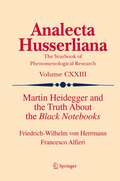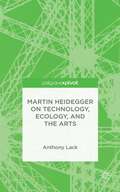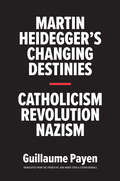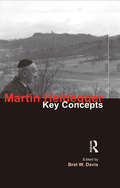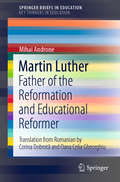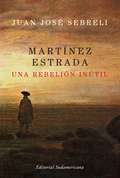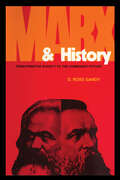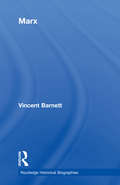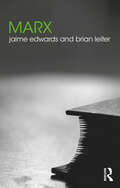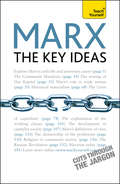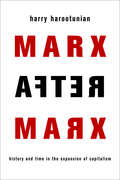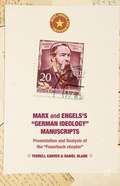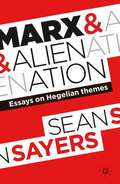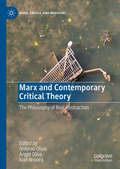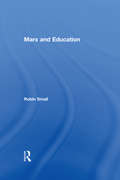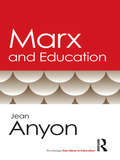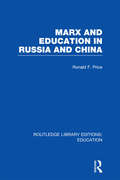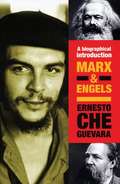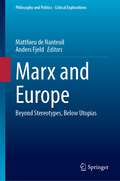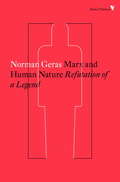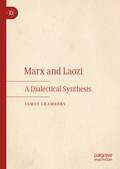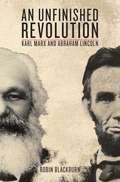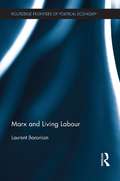- Table View
- List View
Martin Heidegger Saved My Life (Forerunners: Ideas First)
by Grant FarredIn Martin Heidegger Saved My Life, Grant Farred combines autobiography with philosophical rumination to offer this unusual meditation on American racism. In the fall of 2013 while raking leaves outside his home, Farred experienced a racist encounter: a white woman stopped to ask him, &“Would you like another job?&” Farred responded, &“Only if you can match my Cornell faculty salary.&” The moment, however, stuck with him. The black man had gravitated to, of all people, Martin Heidegger, specifically Heidegger&’s pronouncement, &“Only when man speaks, does he think—and not the other way around,&” in order to unpack this encounter. In this essay, Farred grapples with why it is that Heidegger—well known as a Nazi—resonates so deeply with him during this encounter instead of other, more predictable figures such as Malcolm X, W. E. B. DuBois, or Frantz Fanon. Forerunners is a thought-in-process series of breakthrough digital works. Written between fresh ideas and finished books, Forerunners draws on scholarly work initiated in notable blogs, social media, conference plenaries, journal articles, and the synergy of academic exchange. This is gray literature publishing: where intense thinking, change, and speculation take place in scholarship.
Martin Heidegger and the Truth About the Black Notebooks (Analecta Husserliana #123)
by Francesco Alfieri Friedrich-Wilhelm von HerrmannToward the beginning of 2013, I received reports of passages in the Black Notebooks that offered observations on Jewry, or as the case may be, world Jewry. It immediately became clear to me that the publication of the Black Notebooks would call forth a wide-spread international debate. Already in the Spring of 2013, I had asked Professor Friedrich-Wilhelm von Herrmann, last private assistant – and in the words of my grandfather, the “chief co-worker of the complete edition”, – if he might review the Notebooks as a whole, based on his profound insight into the thought of Martin Heidegger, and in particular, review those Jewish-related passages that were the focus of the public eye.Publications about the Black Notebooks quickly came to propagate catchy expressions such as “being-historical anti-Semitism” and “metaphysical anti-Semitism”. The first question that obviously arises is: Does the thought of Martin Heidegger exhibit any kind of anti-Semitism at all?In this book Professor von Herrmann now advances his hermeneutic explication. With Professor Francesco Alfieri of the Pontificia Università Lateranense he has found a colleague who has drawn up a comprehensive philological analysis of volumes GA 94 through GA 97 of the Complete Edition.The fact that Heidegger designated the hitherto published “black notebooks” as Ponderings (Überlegungen) and as Observations (Anmerkungen) has been given little consideration. He intentionally placed them at the conclusion of the Complete Edition because without acquaintance with the lectures, and above all, with the being-historical treatises that would come to be published in the framework of the Complete Edition, they would not be comprehensible. (Arnulf Heidegger)
Martin Heidegger on Technology, Ecology, and the Arts
by Anthony LackLack begins with a discussion of Max Weber's analysis of the disenchantment of the world and proceeds to develop Heidegger's philosophy in a way that suggests a "re-enchantment" of the world that faces the modern condition squarely, without nostalgia.
Martin Heidegger's Changing Destinies: Catholicism, Revolution, Nazism
by Guillaume PayenA portrait of Martin Heidegger as a man and a philosopher In this biography of Martin Heidegger (1889–1976), now available in English, historian Guillaume Payen synthesizes the connections between the German philosopher&’s life and work. Critically, but without polemics, he creates a portrait of Heidegger in his time, using all available sources—lectures, letters, and the notorious &“black notebooks.&” Payen chronicles Heidegger&’s &“changing destinies&”: after the First World War, an uncompromising Catholicism gave way to a vigorous striving for a philosophical revolution—fertile ground for National Socialism. The book reflects a life of light and shadow. Heidegger was a great philosopher and teacher who cultivated friendships and love affairs with Jews but also was an anti-Semitic nationalist who lamented the &“Judaization of German intellectual life.&”
Martin Heidegger: Key Concepts (Key Concepts)
by Bret W. DavisHeidegger's writings are among the most formidable in recent philosophy. The pivotal concepts of his thought are for many the source of both fascination and frustration. Yet any student of philosophy needs to become acquainted with Heidegger's thought. "Martin Heidegger: Key Concepts" is designed to facilitate this. Each chapter introduces and explains a key Heideggerian concept, or a cluster of closely related concepts. Together, the chapters cover the full range of Heidegger's thought in its early, middle, and later phases.
Martin Luther: Father of the Reformation and Educational Reformer (SpringerBriefs in Education)
by Mihai AndroneThis book explores specific aspects of Martin Luther’s ideas on education in general, and on religious education in particular, by comparing them to the views of other great sixteenth-century reformers: Huldrych Zwingli, John Calvin, and Philip Melanchthon. By doing so, the author highlights both the originality of the German reformer’s perspective, and the major impact of the main religious movement at the dawn of modernity on the development of public education in Western Europe. Although Martin Luther was a religious reformer par excellence, and not an educational theorist, a number of pedagogically significant ideas and ideals can be identified in his extensive theological work, which may also qualify him as an education reformer. The Protestant Reformation changed the world, bringing to the fore the relation between faith and education, and made the latter a public responsibility by proving that the spiritual enlightenment of youth, regardless of gender and social origin, is indissolubly linked to instruction in general, and especially to a more thorough understanding of the classical languages, arts, history and mathematics.
Martínez Estrada, una rebelión inútil
by Juan José SebreliUn examen lúcido y fascinante del pensamiento de uno de los ensayistasmás importantes de la Argentina. Juan José Sebreli retrata al autor de «Muerte y transfiguración deMartín Fierro» y «Radiografía de la pampa» de un modo definitivo y aúncon una perspectiva escasamente suficiente: Martínez Estrada es elsolitario, el romántico, el profeta, con el repertorio de blasfemias yel pesimismo como una especie de incurable mal humor. Las sucesivasediciones de este libro se han modificado por el cambio de perspectiva,por el paso de los años -a los que se refiere el autor en los distintosprólogos hasta alcanzar, en el último, una teoría-, pero el escritor ysu volumen permanecen sin alteraciones: ese primer Sebreli pudo cincelaruna figura indiferente a las interpretaciones del futuro.
Marx & History: From Primitive Society to the Communist Future
by D. Ross Gandy&“Gandy has attempted a much-needed reinterpretation of Marx&’s theory of history—one that, everything considered, deserves the reader&’s attention.&” —American Political Science Review In this book Karl Marx&’s observations on history, which are found scattered throughout his voluminous writings, are brought together and subjected to searching analysis—in refreshingly direct language, without jargon. For the first time we have a thoughtful assessment of Marx&’s views on all the epochs that cross his historical vision. D. Ross Gandy treats Marx&’s ideas on primitive societies, on ancient Roman and Asiatic civilization, on the structure of feudalism, on strategies for overthrowing capitalism, and on the hypothetical communist future. Among the author&’s departures from traditional readings of Marx are his interpretations of class struggle, his conception of social strata, and his cogent analysis of the &“new Marxism.&” Since many aspects of Marxist historical theory have been neglected or distorted, Gandy&’s remarkably clear commentary, based on extensive research—including an exhaustive study of the forty-volume Marx-Engels Werke—will doubtless stimulate debate among sociologists and other students of social change, political scientists, and historians.
Marx (Routledge Historical Biographies)
by Vincent BarnettKarl Marx has been portrayed in equal measure both as a political prophet who foresaw the end of capitalist exploitation, and as a populist Anti- Christ whose totalitarian legacy has cost millions of lives worldwide. This new biography looks beyond these caricatures in order to understand more about the real Karl Marx; about his everyday life and personal circumstances as well as his political ideology. The book tells the life story of a man of ideas, showing how his political and economic thought developed alongside his life and practical work. Vincent Barnett seeks to paint Karl Marx not as a static, unwavering character, but as a man whose beliefs developed dynamically over time. The book explores his personal background, and problems of personal income and family health. It also examines the influence of Hegel's methods on Marx's work, and his relationship with Engels. This lively, up to date guide to the life of Karl Marx provides an excellent starting point for students in history, politics and philosophy, and for all those with an interest in Marxism and political ideas.
Marx (The Routledge Philosophers)
by Brian Leiter Jaime EdwardsThe writings of Karl Marx (1818–1883) have left an indelible mark not only on the understanding of economics and political thought but on the lives of millions of people who lived in regimes that claimed (wrongly) his influence. Trained as a philosopher and steeped in the thought of Hegel, Marx turned away from Hegelian philosophy after 1845 towards a philosophy that incorporated economics and history. It is this Marx that endures and to which this outstanding introduction is devoted.Jaime Edwards and Brian Leiter begin with an overview of Marx's life and intellectual development, including his early years as a journalist in Germany before his exile in London. They then introduce and assess the fundamental elements of Marx’s thought: Marx’s theory of history and historical change (historical materialism) class conflict, the state, and the Communist revolution Marx’s theory of economics, especially the labour theory of value, and his prediction of the collapse of capitalism the nature and role of ideology in Marx’s thought Marx’s theory of human nature and the good life, including his arguments concerning alienation Marx’s legacy and influence, including Western Marxism, the Frankfurt School, and “feminist Marxism”. Including annotated further reading suggestions at the end of each chapter and a glossary of technical terms, this is an indispensable introduction to Marx's philosophical thought. It will also be extremely useful to those in related disciplines such as politics, sociology, history, and political economy.
Marx - The Key Ideas: Teach Yourself
by Gill Hands[Teach Yourself] Marx - the Key Ideas will quickly familiarize you with the revolutionary thinking of this great man. It will take you through all the essential concepts - from class struggle to dialectical materialism. Expressing Marx's sometimes complex ideas in simple terms, and backed up with references to his own texts, this book gives you everything you need to know.NOT GOT MUCH TIME?One, five and ten-minute introductions to key principles to get you started.AUTHOR INSIGHTSLots of instant help with common problems and quick tips for success, based on the author's many years of experience.TEST YOURSELFTests in the book and online to keep track of your progress.EXTEND YOUR KNOWLEDGEExtra online articles at www.teachyourself.com to give you a richer understanding of Marx.FIVE THINGS TO REMEMBERQuick refreshers to help you remember the key facts.TRY THISInnovative exercises illustrate what you've learnt and how to use it.
Marx - The Key Ideas: Teach Yourself (Teach Yourself General)
by Gill Hands[Teach Yourself] Marx - the Key Ideas will quickly familiarize you with the revolutionary thinking of this great man. It will take you through all the essential concepts - from class struggle to dialectical materialism. Expressing Marx's sometimes complex ideas in simple terms, and backed up with references to his own texts, this book gives you everything you need to know.NOT GOT MUCH TIME?One, five and ten-minute introductions to key principles to get you started.AUTHOR INSIGHTSLots of instant help with common problems and quick tips for success, based on the author's many years of experience.TEST YOURSELFTests in the book and online to keep track of your progress.EXTEND YOUR KNOWLEDGEExtra online articles at www.teachyourself.com to give you a richer understanding of Marx.FIVE THINGS TO REMEMBERQuick refreshers to help you remember the key facts.TRY THISInnovative exercises illustrate what you've learnt and how to use it.
Marx After Marx: History and Time in the Expansion of Capitalism
by Harry HarootunianIn Marx After Marx, Harry Harootunian questions the claims of Western Marxism and its presumption of the final completion of capitalism. If this shift in Marxism reflected the recognition that the expected revolutions were not forthcoming in the years before World War II, its Cold War afterlife helped to both unify the West in its struggle with the Soviet Union and bolster the belief that capitalism remained dominant in the contest over progress. This book deprovincializes Marx and the West's cultural turn by returning to the theorist's earlier explanations of capital's origins and development, which followed a trajectory beyond Euro-America to Asia, Africa, and Latin America. Marx's expansive view shows how local circumstances, time, and culture intervened to reshape capital's system of production in these regions. His outline of a diversified global capitalism was much more robust than was his sketch of the English experience in Capital and helps explain the disparate routes that evolved during the twentieth century. Engaging with the texts of Lenin, Luxemburg, Gramsci, and other pivotal theorists, Harootunian strips contemporary Marxism of its cultural preoccupation by reasserting the deep relevance of history.
Marx And Engels’s "german Ideology" Manuscripts
by Terrell Carver Daniel BlankThis work presents a wholly original translation and philosophical analysis of the two authors' rough work in the so-called 'Feuerbach' chapter.
Marx and Alienation
by Sean SayersThe concepts of alienation and its overcoming are central to Marx's thought. They underpin his critique of capitalism and his vision of future society. Marx's ideas are explained in rigorous and clear terms. They are situated in the context of the Hegelian ideas that inspired them and put into dialogue with contemporary debates.
Marx and Contemporary Critical Theory: The Philosophy of Real Abstraction (Marx, Engels, and Marxisms)
by Antonio Oliva Ángel Oliva Iván NovaraThis edited volume brings together an international and interdisciplinary group of scholars to explore the traces of the idea of “Real Abstraction” in Marx’s thought from the early to late writings, as well as the theoretical and practical consequences of this notion in the capitalist social system. Divided into two main parts, Part One reconstructs Marx’s notion of “Real Abstraction” and the influences of earlier thinkers (Berkley, Petty, Franklin, Feuerbach, Hegel) on his thoughts, as well as the further elaborations of this concept in later Marxist thinkers (Sohn-Rethel, Lukács, Lefebvre, Adorno and Postone). Part Two then considers the reverberations of the notion in the field of critical theory from a more abstract critique of capitalist social relations, to a more concrete understanding of historical movements. Taken together, the chapters in this volume offer a focused look at the concept of “Real Abstraction” in Marx.
Marx and Education
by Robin SmallMarx and Education is the first assessment of the educational thought of Karl Marx (1818-1883) and its later influence, in the light of developments at the close of the twentieth century. It provides a new perspective, in which many aspects of Marx's ideas are seen clearly for the first time, freed from misleading associations and outdated prejudices. Marx's thinking on education touches on many still current issues: about personal development, the nature of learning, and the ultimate aims of education, as well as the relations between the school and society. Robin Small explores Marx's approach to each of these issues and in relating them to later developments brings the story up to the present day.
Marx and Education (Routledge Key Ideas in Education)
by Jean AnyonThere was only one Karl Marx, but there have been a multitude of Marxisms. This concise, introductory book by internationally renowned scholar Jean Anyon centers on the ideas of Marx that have been used in education studies as a guide to theory, analysis, research, and practice. Marx and Education begins with a brief overview of basic Marxist ideas and terms and then traces some of the main points scholars in education have been articulating since the late 1970s. Following this trajectory, Anyon details how social class analysis has developed in research and theory, how understanding the roles of education in society is influenced by a Marxian lens, how the failures of urban school reform can be understood through the lens of political economy, and how cultural analysis has laid the foundation for critical pedagogy in US classrooms. She assesses ways neo-Marxist thought can contribute to our understanding of issues that have arisen more recently and how a Marxist analysis can be important to an adequate understanding and transformation of the future of education and the economy. By exemplifying what is relevant in Marx, and replacing that which has been outdone by historical events, Marx and Education aims to restore the utility of Marxism as a theoretical and practical tool for educators.
Marx and Education in Russia and China (Routledge Library Editions: Education)
by R F PriceTo many education students, Russian and/or Chinese education is at the same time their introduction to Marxism, and many students go no further. This book sets the record straight by giving a thorough introduction to the writings of Marx himself as they relate to education. It shows what Marxism implies for education, as aim, method and content. It then proceeds to compare educational developments in the former USSR and China in the light of this analysis, attempting to answer the question as to how Marxist this has been, in the schools and outside them.
Marx and Engels: A Biographical Introduction
by Ernesto Che GuevaraThis Che Guevara book makes an insightful contribution to the revival of interest in Marxism. Commenting on Marx's humanism, Che writes: "Such a humane man, whose capacity for affection extended to all those suffering throughout the world."
Marx and Europe: Beyond Stereotypes, Below Utopias (Philosophy and Politics - Critical Explorations #30)
by Matthieu De Nanteuil Anders FjeldThis book provides a unique scientific contribution to the debate on Marx's legacy in proposing to critically articulate two “lines of discussion” which are most often kept apart. On the one hand, it reassesses the place of Marxian thought in the construction of Europe, seeking to revitalize the European political debate. On the other, it situates Marx' thought in the perspective of postcolonial and decolonial studies, with particular attention to their effort to overcome the indisputable limits of the Marxian legacy. In asking whether Marx’ thought was too European or not European enough, the book examines internationalist emancipatory politics and eurocentrism, class struggle and finance in the shaping of the European institutions, migration, identity and violence, as well as Marxian critiques of colonialism both within and beyond Europe. At a time of extreme tension, also within leftist politics, this book provides a precise and rigorous argument on what continues to make Marx'sthought relevant, in grappling with social domination in the era of global capitalism, while also exploring the limits of Marxism today, both at the European level and worldwide.
Marx and Human Nature
by Norman Geras"Marx did not reject the idea of a human nature. He was right not to do so."That is the conclusion of this passionate and polemical new work by Norman Geras. In it, he places the sixth of Marx's Theses on Feuerbach under rigorous scrutiny. He argues that this ambiguous statement--widely cited as evidence that Marx broke with all conceptions of human nature in 1845--must be read in the context of Marx's work as a whole. His later writings are informed by an idea of a specifically human nature that fulfills both explanatory and normative functions.The belief that Marx's historical materialism entailed a denial of the conception of human nature is, Geras writes, "an old fixation, which the Althusserian influence in this matter has fed upon ... Because this fixation still exists and is misguided, it is still necessary to challenge it." One hundred years after Marx's death, this timely essay--combining the strengths of analytical philosophy and classical Marxism--rediscovers a central part of his heritage.
Marx and Laozi: A Dialectical Synthesis
by James ChambersIn this work the theories of Marx and Laozi are dialectically combined. The resulting synthesis is a positive materialist negation of Hegel’s idealist dialectics. Syntheses are presented for Marx and Laozi in ontology, metaphysics, epistemology, scientific method, ethics and politics: the full spectrum of their foundational principles. The book is an attempt to reconstruct a materialist interpretation of Laozi, which can be put to work for Marxist theory.
Marx and Lincoln: An Unfinished Revolution
by Abraham Lincoln Karl Marx Robin BlackburnKarl Marx and Abraham Lincoln exchanged letters at the end of the Civil War. Although they were divided by far more than the Atlantic Ocean, they agreed on the cause of free labor and the urgent need to end slavery. In his introduction, Robin Blackburn argues that Lincoln's response signaled the importance of the German American community and the role of the international communists in opposing European recognition of the Confederacy. The ideals of communism, voiced through the International Working Men's Association, attracted many thousands of supporters throughout the US, and helped spread the demand for an eight-hour day. Blackburn shows how the IWA in America--born out of the Civil War--sought to radicalize Lincoln's unfinished revolution and to advance the rights of labor, uniting black and white, men and women, native and foreign-born. The International contributed to a profound critique of the capitalist robber barons who enriched themselves during and after the war, and it inspired an extraordinary series of strikes and class struggles in the postwar decades. In addition to a range of key texts and letters by both Lincoln and Marx, this book includes articles from the radical New York-based journal Woodhull and Claflin's Weekly, an extract from Thomas Fortune's classic work on racism Black and White, Frederick Engels on the progress of US labor in the 1880s, and Lucy Parson's speech at the founding of the Industrial Workers of the World.
Marx and Living Labour: Marx And Living Labour (Routledge Frontiers of Political Economy)
by Laurent BaronianFrom his early economic works on, Marx conceived the labour of any kind of society as a set of production activities and analysed the historical modes of production as specific ways of distributing and exchanging these activities. Political economy on the contrary considers the labour only under the form of its product, and the exchange of products as commodities as the unique form of social labour exchange. For Marx, insofar as the labour creating value represents a specific mode of exchanging the society's living labour, general and abstract labour cannot not only be defined as the substance or measure unit of the commodity, as in Smith or Ricardo, but foremost as an expense of living labour, i.e. of nerves, muscles, brain, etc. Hence the twofold nature of living labour, as a concrete activity producing a use value and an expense of human labour in general producing exchange value. Marx himself claimed that this twofold nature of labour creating value was its main and most important contribution to economic science. This book aims at showing how both determines the original categories and economic laws in Capital and constitutes the profound innerspring of Marx's critique of political economy. The role and function of living labour is highlighted by dealing with the difference between Marx and Classics' theories of labour value; money and the problems of its integration in economic analysis, especially in Keynes; the transition from feudalism to capitalism; the theory of capital through a discussion on the Cambridge controversy and the transformation problem; the labour process and the principles of labour management; unemployment and overpopulation; the formulas of capital in the history of economic thought; finally, an interpretation of the current crisis based on Marx's conception of overaccumulation and speculation after having distinguished it from underconsumption and stagnation theories of crises.

